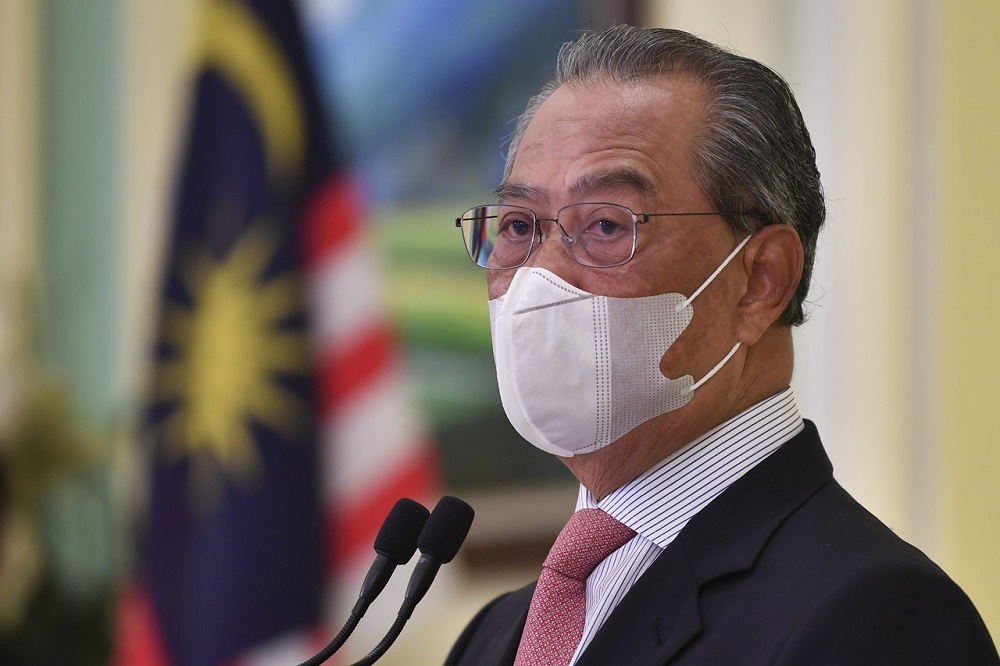Prime Minister Tan Sri Muhyiddin Yassin says among the sectors that will benefit from the effort were the sustainable energy sector, low carbon mobility, waste management and recycling and water efficiency. — Bernama pic
PUTRAJAYA, July 13 ― Prime Minister Tan Sri Muhyiddin Yassin today said that the transformation of cities in Malaysia into low-carbon cities will help develop the local green economy, create jobs and attract domestic and international investments.
In his speech at the launch of the virtual Malaysia Low-Carbon Cities Conference 2021 today, Muhyiddin said among the sectors that will benefit from the effort were the sustainable energy sector, low carbon mobility, waste management and recycling and water efficiency.
He said to systematically strengthen the implementation framework of low carbon initiatives and achieve a significant carbon emission reduction target, the National Low-Carbon Cities Master Plan was launched today to provide complete guidelines for state governments and local authorities in developing low carbon cities in their areas.
“The process of transition and transformation of low-carbon cities will bring about a positive impact on all of us in reducing the effects of climate change,” he said.
His speech text was read out by the Minister of Environment and Water Datuk Seri Tuan Ibrahim Tuan Man.
Citing a paper titled “Accelerating Low-Carbon Development in the World’s Cities” by Global Commission on the Economy and Climate, Muhyiddin said the analysis showed that low-carbon cities represent US$16.6 trillion in economic opportunities worldwide based only on energy efficiency and low carbon investments.
Muhyiddin said various efforts had been implemented since 2011 through the implementation of the Low-Carbon Cities Framework (LCCF) to provide support to local authorities at the state and municipal levels in achieving the low carbon cities agenda.
The Low-Carbon Cities Catalyst Grant (GeRAK) amounting to RM35 million had also been launched as an incentive and support measure for local authorities to implement the high-impact low-carbon cities initiative, he said.
He added that the role of local authorities was very important in planning the socio-economic development and environmental infrastructure of a city, and they also helped in the implementation of environmental conservation initiatives at the national and local levels.
“As entities at the administrative level which are closest to the people, local authorities need to play an important and active role in educating, mobilising and responding to the community as well as promoting sustainable and inclusive development,” he said.
Examples of cities in the world that have adopted the low-carbon concept to reduce the impact of climate change are Amsterdam, Copenhagen, Tianjin, Zhenjiang, Hong Kong and Tokyo, he said.
Muhyiddin said the Intergovernmental Panel on Climate Change findings showed that if greenhouse gas emissions continue at existing rates, global temperature is expected to rise to 1.5 degrees Celsius between 2030 and 2052.
He said the increase in global temperature would indirectly affect the earth’s ecosystem such as extreme weather changes.
“We can see that sometimes the country experiences longer drought and erratic rainfall. This instability has led to water supply crises and severe flash floods in several states.
“However, we are not denying that the occurrence of this phenomenon is also contributed by economic activities as well as unsustainable physical and socio-economic infrastructure development,” he said.
Muhyiddin said the government had taken mitigation and adaptation measures to reduce the impact of climate change and global warming, including promoting renewable energy and energy efficiency practices. — Bernama

